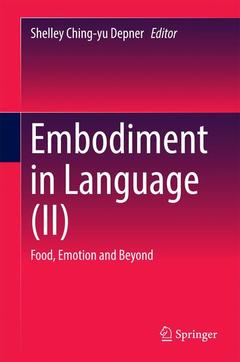Embodiment in Language (II), 1st ed. 2016 Food, Emotion and Beyond
Langue : Anglais
Coordonnateur : Depner Shelley Ching-yu

This book provides useful strategies for language learning, researching and the understanding of social factors that influence human behavior. It offers an account of how we use human, animal and plant fixed expressions every day and the cultural aspects hidden behind them. These fixed expressions include various linguistic vehicles, such as fruit, jokes and taboos that are related to speakers? use in the real world. The linguistic research in Mandarin Chinese, Hakka, German and English furthers our understanding of the cultural value and model of cognition embedded in life-form embodiment languages.
Chapter 1 Introduction.- Part I. Embodiment and Food.- Chapter 2 Food Metaphors in Taiwan Hakka.- Chapter 3 Pragmatic Functions of Hakka Proverbs: Humor, Praise and Food.- Chapter 4 Fruit and Some Plant Vehicles in Mandarin Chinese, English and German.- Part II. Embodiment and Emotion.- Chapter 5 How do Men and Women Express Emotion Differently.- Chapter 6 Taboos in Animal Fixed Expressions in Mandarin Chinese.- Chapter 7 Euphemisms in Animal-Fixed Expressions in Mandarin Chinese.- Part III. Embodiment in Broader Contexts.- Chapter 8 The Punchlines of Jokes about Women in Italian, English, Spanish and Mandarin Chinese.- Chapter 9 Legendary Animal Metaphors in Political and Economic Discourse.- Chapter 10 Prototypical Effect and Cultural Implication of Hakka Proverbs.- Chapter 11 How do Taiwanese Second Language Learners Learn English Body Part Metonymy.- Chapter 12 Conclusion.
Shelley Ching-yu Depner is a professor at Department of Foreign Languages and Literature in National Cheng Kung University, Taiwan. She has a PhD in Linguistics from Tübingen University, Germany in 2001. The focus of her research is a cross-cultural comparison of the cognitive semantics and sociolinguistics of Mandarin Chinese and German.
Compiles cross-cultural research using life-form fixed expressions by taking cognitive and semantic point of views Provides useful strategies for language learning, researching and the understanding of social factors that influence human behavior Discusses the various aspects that could be hidden behind life-form fixed expressions, such as food names and taboos Includes supplementary material: sn.pub/extras
Date de parution : 11-2016
Ouvrage de 216 p.
15.5x23.5 cm
Thème d’Embodiment in Language (II) :
© 2024 LAVOISIER S.A.S.



